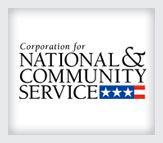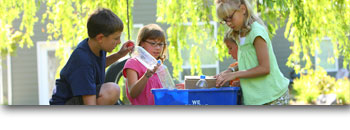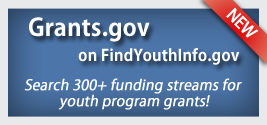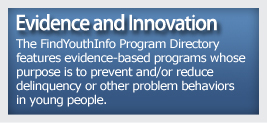Service-Learning
Service-learning is a strategy that integrates meaningful community service with instruction and self-reflection to support academic learning, teach civic responsibility, and strengthen communities. Service-learning is a pedagogical method that extends beyond volunteering and community service to intentionally integrate service into academic coursework and curriculum and provide mutually beneficial partnerships between learners and the community (Muscott, 2001). According to Learn and Serve America, a program of the Corporation for National and Community Service, service-learning builds on getting involved in the community and on principals of democracy, citizenship, and character education (Learn and Serve America, 2010).
From the early days of public education in the United States, prominent thinkers and reformists including Horace Mann (1849) and John Dewey (1916) suggested that schools should aim to go beyond academic goals and help students develop the needed critical thinking skills for solving problems, making ethical decisions, and participating in society as caring individuals and responsible citizens. Today, elementary, middle, and high schools across the nation participate in service-learning with the support of federal, state, district, and foundations’ funding.
Dewey, John. (1916). Democracy and education: An introduction to the philosophy of education. New York, NY: Macmillan.
Learn and Serve America (2010). What is service learning? Retrieved from http://www.learnandserve.gov/about/service_learning/index.asp
Mann, H. (1849). Twelfth annual report covering the year 1848. Boston, MA: Dutton and Wentworth, State Printers, 90.
Muscott, H. (2001). An introduction to service-learning for students with emotional and behavioral disorders: Answers to frequently asked questions. Beyond Behavior, 10(3), 8-15.
Collaboration Profiles
Youth Voices
Feature Articles
Tools & Guides
Technical Assistance
Websites
Departments
 |
Illinois High School Addresses Teen Traffic Safety Through Service-Learning Approach Motor vehicle crashes are the leading cause of death for teens, accounting for approximately one-third of all teenage deaths (Centers for Disease Control and Prevention, 2010). Per mile driven, teen drivers ages 16 to 19 are four times more likely than older drivers to be involved in a crash (CDC, 2009). |
 |
Stopping the Summer Slide with Energy Express Under the leadership of the West Virginia University Extension 4-H Youth Development, Energy Express is a research based summer reading and nutrition program for children living in rural and low-income West Virginia. |
 |
AmeriCorps NCCC: Strengthening Communities and Developing Leaders The National Civilian Community Corps (NCCC) is one of the three programs that form AmeriCorps, a network of national service programs that engage Americans in service to address critical community needs within the United States. AmeriCorps NCCC is a full-time, team-based residential program for men and women ages 18-25. |


Announcements
Youth Topics
Collaboration Profiles
Briefs
Youth Voices
Feature Articles

Map My Community is a tool designed specifically to assist you in locating resources in your community to help you build and strengthen your youth program. Get ideas for new partnerships, identify gaps in your community, and learn about resources to avoid duplication of effort.




















